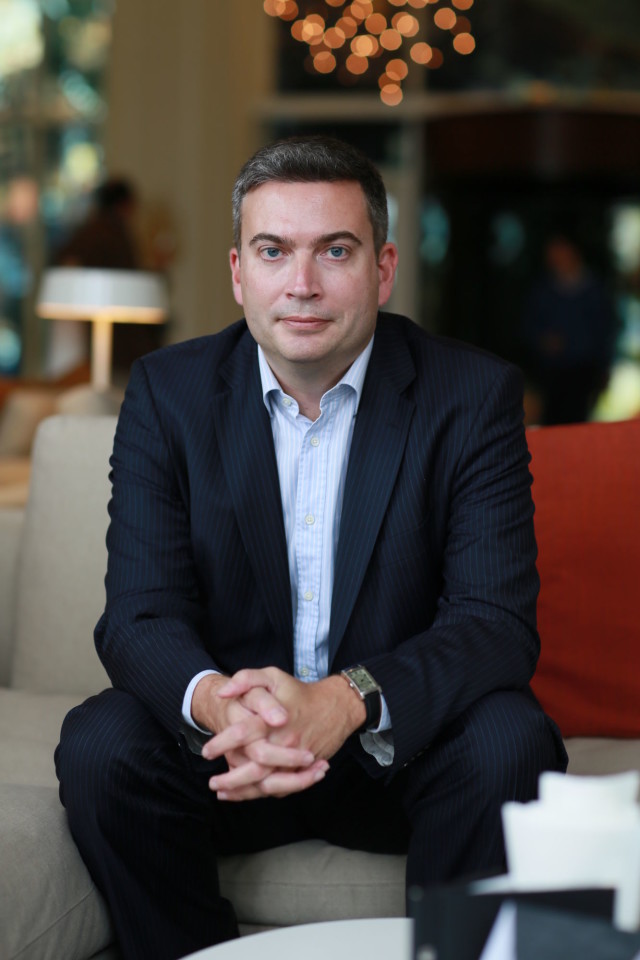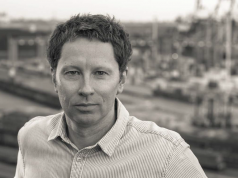The French IMF Resident Representative in Ukraine, Jerome Vacher, was appointed to his position in the spring of 2013, and is now leaving his post at the beginning of July, 2017 after a tumultuous four years. A consummate professional and an elegant figure around Kyiv, Vacher has been widely lauded for his stewardship of the Kyiv office in the middle of a very difficult time. During the course of his tenure the Ukrainian state went through a revolution, a war, massive currency devaluation, spiraling inflation, the structural reform of the central bank, a fraught process of decommunization and the nationalization of the nation’s largest private bank. The Odessa Review’s editor Vladislav Davidzon caught up with Vacher for an early breakfast in Odessa and a conversation about what more remains to be done by the Ukrainian people and Ukrainian state in order to advance the critically needed reform process.
The Odessa Review (Vladislav Davidzon): Thank you for speaking with us. Let us begin with an appraisal of the state of the Ukrainian economy and the issues facing the country at the end of your mission. Are you satisfied with what the IMF has accomplished in your time here? What more remains to be done?
Jerome Vacher (JV): Yes, I mean lot has been done. I think that together with the Ukrainian authorities we have achieved significant macroeconomic stabilization, and what is important is that this was not the traditional macroeconomic stabilization. It was done in very difficult and even unique circumstances, in the midst an ongoing conflict, and with significant external shocks to the economy including on trade — so you know looking back, I think, it is a major achievement to be able to stabilize the economy in such circumstances. However, I cannot say confidently that Ukraine is yet on a sustainable growth path, meaning that I think it is not yet on a “Polish type of growth path”, when in fact I’m quite convinced that this country could achieve that.
OR: You are certain that Ukraine could replicate the Polish experience?
JV: I am. I remain quite convinced that this country could achieve it provided that the proper policies are put into place, and the proper changes are put in place. I’ve become persuaded that this country has a lot of potential. It has great people and human capital and great resources, so there’s no reason why that shouldn’t be achievable.
Now what does it mean to achieve sustainable growth? It basically means, in our mind- and this is not just economic jargon — avoiding the boom and bust cycles that we have seen in the past 20 years in Ukraine. Those boom and bust cycles took place, without basically, providing significant gains for the average person, or the whole population. There’s been some progress but a lot of it is stop and go, and so finally, there is a lack of overall progress and thus we see Ukraine lagging behind, especially in terms of income per capita when it could potentially be a rich and quickly growing country.
So what sustainable growth means in that context is avoiding those boom and bust cycles, having broader based growth, creating more opportunities for the whole population, and having external accounts that basically would be in the kind of shape to allow that. That means the country should be able to grow without running into large deficits and only running deficits which are financeable.
What I fear is that there is not always a connection made between the need to address this external situation and the need to make those deep structural changes, and in this country it means basically improving the business environment and reducing corruption. That is the main meaning of structural reforms for this economy in particular.
I feel that there is not much of an understanding of that link being made however. I mean structural reforms are important by themselves, but they are important so that Ukraine can achieve more sustainable growth, so that it can basically avoid those boom and bust cycles that I mentioned. That means improving the business environment and being able to attract foreign direct investment. There is very little foreign direct investment in this country. Attracting foreign investment will allow a more financeable current account deficit. So I feel, unfortunately, that there is not enough of a link being made between those different aspects of reform.
OR: What is the reason for that lack of linkage?
JV: Partly it is a capacity issue. There is a lot of progress that has been made in Ukraine on the understanding of economic policies, but there is still some capacity issues at the technical level of implementation. I think in many parts of the government there is a good understanding of the challenges that people may face, but, still there is still some progress in the understanding of the linkages between different parts of reform, partly because there is a learning by doing aspect to it of course. So it is not only an economic issue.
OR: So, in which areas of macroeconomic policy has Ukraine improved, is it doing as well as could be expected with fiscal policy, with reigning in inflation? Which indicators are still lagging? What would you say?
JV: Well I would say to me the brightest part is how the central bank has changed: the way the central bank is now conducting macroeconomic policy and in particular monetary policy but also banking sector supervision. It is now a much more modern central bank. I remember when I arrived in the spring of 2013, I was dealing with a central bank that didn’t have a good understanding of the numbers, didn’t have good analysis, didn’t have a good grasp of banking sector issues, so that has changed tremendously and there’s been a significant change in the way that central bank policies are conducted.
OR: So [outgoing Ukraine Central Bank governor] Valeria Gontareva was successful?
JV: As a governor she has achieved a lot in very difficult circumstances and it would be important going further that those achievements be kept. It’s important that everybody understand that of course, this has all been done in very difficult circumstances with the exchange rate depreciating and banks closing, but that it was part of a necessary adjustment. So, I think it is important that there is no reversal of this important progress, and in particular that there be proper resistance to the calls for economic populism which take place frequently. On fiscal policy, I think that beyond the quite dramatic stabilization that we have seen there have been some more structural improvements that are on the way. There is still some way to go, but we have seen some significant improvements in the way that procurement is done for example, and we are now talking about things which we were not talking about or even envisaging, a few years ago, such as talking about medium term budget planning. I think that tax administration reform on the other hand is progressing still way too slowly. There has been some progress but it is still way too slow. It’s not only important for the way fiscal policy is conducted but its also important to improve the business environment.
OR: Following up on that, do you feel the Ukrainians have done all that they need to do, or could they fairly be expected to have done more to meet their commitments to the international community? On an ethical level even? Has the current government delivered on all the promises made and have we even asked enough of them?
JV: With hindsight, and basically looking back, I think a lot has been done since 2014 and we shouldn’t discount it at all. Even though in my view a lot more could have been done, of course. I can testify personally to the fact that on a daily basis there is a lot of frustration that some things do not get done or do not get done quickly enough. In particular that some things do not get through the political system quickly enough and that there are still a lot of roadblocks and stumbling blocks. Yet, when I look back, of course it is much better than everything that has been achieved in the past 20 years and testifying to that, we at the IMF have been able to go much further in the support that we provide. So our role is to support this process but it is also our role to push and advise. And I think that it is important for us to be consistent and that we need to be firm on our positions, because I think our not being firm on the right policies does not fundamentally help Ukraine. There is always a limit to what can be done. In particular I find that for me personally being here on the ground and close to policy makers you find out quickly that without proper ownership of the policies, you will find that you will hit some stumbling blocks and will see implementation lagging. So there is only so much that we can do, and it’s really important for us also to work with authorities which have deep ownership of these policies. It is important to have a strong drive to implement them, without which it would be very difficult. Because we are not in charge of implementing those policies. We are here to support and advise on the proper policies, but ultimately the implementation of the needed policies can only be done by the authorities.
OR: So, three years after the Maidan revolution, after the conclusion of the Maidan, much of the Ukrainian public, or at least a very vocal and intense minority, is unsatisfied with the pace of reforms. Are those feelings legitimate? Myself, I find it very hard to explain to people as someone who covers Ukrainian politics, goes to conferences and speaks to policy makers, looks at statistics, that things are proceeding at some acceptable pace. I find myself being stymied in trying to explain to people, both inside and outside the country, how remarkable it is in many ways what the Ukrainians have achieved. You know, in such a short span of time. Is it fair to say that there is a communication issue?
JV: I think, with the Maidan and its aftermath, strong expectations have been built up, with the fight against corruption in particular. It is of course fully legitimate, and is also fully legitimate to have high standards, and it is fully legitimate to aim at zero tolerance on corruption. It is in fact the only way to deal with such deep and entrenched corruption. And of course, in my view at least, officials of course have to lead by example as well. So I think also that corruption is much more exposed and discussed now, and that is a good thing of course. Because, the way to deal corruption is to shed light on it. Corruption doesn’t like light and transparency. So it is a good thing, but it is also a double-edged sword in the sense that some people have the impression, maybe, that the level of corruption has not changed or has even worsened. Which in fact makes it much more important that any exposure of corruption is followed by proper action as otherwise it will just lead to more frustration. I think also, that beyond this issue of high expectations and corruption with the conflict and the shocks that we have seen that this has not been a smooth ride obviously. Which of course may be disappointing for a lot of people, but unfortunately it is one that has to be gone through. There’s a lot of pain but it’s also why, for the population if there is some economic pain it’s important to understand that there is a perspective, there is a medium term change and that things are going in the direction of change.
Now on the issue of communication, I think you are right in the sense that it is in part a problem of communication. Though there has been a lot of improvement on that front, also, to sustainably communicate something, you of course need substance as well. That means you need to be able to communicate not only about past achievements but also about continuation of achievements and change. That is the only way to make your communication fully credible. And of course, there are also some specific issues that particularly need communication, such as pension and land reforms, because they are complex and they are politically sensitive issues, and they are often manipulated by populist forces and vested interests. And also what we see very often in Ukraine is that sometimes vested interests are also using these populist economic ideas.
OR: It’s been known to happen. Unfortunately. Ok. In that case, let’s speak about what your legacy is in terms of anti-corruption. Let’s speak about what the IMF and Ukraine’s Western partners have done to shepherd along the fight against corruption. It is quite arguable that the IMF does not get enough credit for its advocacy on behalf of the NABU (National Anti-Corruption Bureau of Ukraine) and the newly proposed anti-corruption court.
JV: Well, I mean you know, we are not looking for any kind of credit so to speak…
OR: Still, the historical record matters.
JV: Yes, of course it matters, but we are not looking for any kind of credit or recognition. We are here to help and we are here to support the authorities when they want to do the right changes and policies. And it is much better that if the authorities do the right thing, that they get the credit for it, which will stimulate them to do more of the good thing. I think there is lots that needs to be done. We have seen the creation of institutions in 2014, it’s true that we advised the government on the creation of NABU and we supported it all the way to make it fully operational. And we still continue to support it, I hope that we will be able to do the same with the anti-corruption courts. It is something that civil society is strongly supporting and that we will support as well, and it is why the anti-corruption court is needed. What we have seen is that there has been progress with the creation of the NABU. It relatively quickly became a strong institution which is able to investigate cases, and which is able along with the anti-corruption prosecutor to prosecute them also. But unfortunately, what we see is a that many of these cases die in court, because of a lack of judicial reform. The judicial system is still unreformed, there are still a lot of issues of corruption in the judicial system as well. So the missing link essentially, is the judicial element and the only way to quickly achieve results is the creation of an anti-corruption court, which would be a strong and credible institution. Merely creating a so called chamber instead of a full fledged anti-corruption court, would not be enough in our view in achieving significant gains. But let me say that it’s only one part of the equation because the fight against corruption has to be pretty broad based. We have been pretty focused on what we can do on our limited scale, because it is not necessarily the core of our mandate, or of our expertise. So we have to focus on a few aspects, like the national anti-corruption bureau or the creation of the anti-corruption court, so that in our support we have been able to be quite focused and the most efficient possible.
But it’s also important to understand that there are lots of policies that we have supported which are not labeled as anti-corruption but which still have an impact on corruption. In particular, within the energy sector and in the financial sector— for example closing some of the banks which were improperly used by their owners — was also part of the fight, I guess, against corruption. So that’s it’s important to define it in a broader way as this issue permeates a lot of aspects of economic policies, and is in many ways “macro critical”.
OR: Let us speak very briefly about progress that was made in the energy sector, and with Ukrainian energy independence over the past several years…
JV: I think it is important to make a distinction between energy independence and energy security.
OR: Both of which Ukraine needs of course.
JV: What is important is that Ukraine be able to use energy in a much less inefficient way. Ukraine was highly energy inefficient. Consumption was 10 times higher, or rather I mean the Ukrainian economy was ten times more energy intensive than the average OECD country.
OR: Ten times? That sounds horrible.
JV: It is, but what we have seen that with some of the reforms of the sector, and not only because there was also a significant economic downturn at the same time, Ukraine is able to import much less energy than in the past. More importantly, it has been able to secure its energy needs based on regular market approaches and so now it is less susceptible to political pressure, or political influence, or governance issues. So I think that is an important thing, and again, to us, in structural terms, that’s another bright spot, that is more of a structural change and similar to what we have seen with financial sector reforms.
OR: So let’s speak about your personal observations of Ukraine’s political and social maturation during the last few years. In my conversation with you I have noticed that you have an unusually wide circle of people that you speak with, so you are likely better acquainted with the social views of ordinary people than are many political and economic elites. What have you learned about Ukrainians in the time that you have been here?
JV: Well, what I have seen is a lot of resilience from the Ukrainian population, a great deal of positive qualities which should be important in the modern world, including a very strong creativity and openness as well as a sense of innovation. All of which should have, in today’s world a great effect. I think I have seen some degree of political economic and social maturation of course. Again, it is a process which is still ongoing, which will surely take some time. What I’ve learned is that bold steps, and the drive of the people, are particularly important, especially in this system where there has been a lot of inertia in the past. A strong drive is needed as well as particularly strong motivation…
OR: To break out of past dependency?
JV: Yes and particularly, it requires a strong sense of public service, which in the past was not frequently enough found here. But what I have seen is a promising and very strong civil society, which is a very important partner for us and which you don’t necessarily see in many countries. I think that is very positive and very promising. We see that there is an emerging class of policy makers which is educated, open to the world, with integrity and ready to change things, and to make sacrifices.
OR: This is the rising young class of NGO leaders and young people in their early 30’s now.
JV: Generally speaking, ideally they should permeate into policy making and there should be a real effort to be in a critical mass of reformers. You know that there is no reform without reformers, so that is something that you realize when you are involved in day-to-day policy making on the ground. There is no reform without reformers and the human aspect is particularly important. And I think, in that sense, provided that we continue to get this critical mass of people willing to change things, that have the courage to do so, I think, I’m quite confident that Ukraine is maturing and changing for the better.
OR: So what more can be done by Ukrainians to continue the decommunization process?
VD: I think that we have seen already the decommunization process under way. It is a positive step that the Ukrainians have jettisoned some of their economic illusions. I have realized that there were a number of illusions which of course were very painful to dispel, but to a large extent are now gone. For example, the illusion that you would not pay the real price for energy, the illusion that the exchange rate wouldn’t reflect economic fundamentals. From a purely economic perspective there were a lot of illusions which were in fact related to prices. So there has been a complete adjustment which to some extent was delayed, when a lot of countries in the region had undertaken that transition, so in a way this was a second transition for Ukraine.
OR: Thank you for speaking with us and also for all of your efforts on behalf of Ukraine. We do hope that our next IMF representative will be no less dapper and elegant.
I think what matters in the end is that the people we have on the field are able to have a good dialogue with policy makers, and are able to fully understand what is going on in the economy. To fully understand what is going on in the operating environment for our programs. A good part of my task is to be able to explain to me colleagues what is going on. And secondly, it is to be able to have a proper dialogue with policy makers and all relevant stakeholders, to advise them properly, effectively and to get things moving forward. That is the most important matter.




































